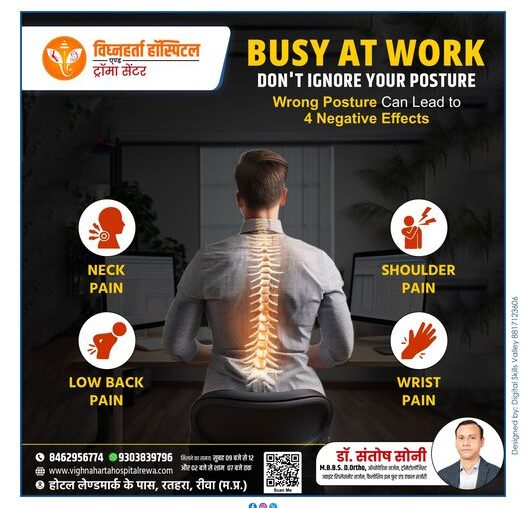In today’s fast-paced world, many of us spend long hours sitting at desks, hunched over computers, or glued to our smartphones. While our focus remains on productivity, one critical aspect often gets ignored — our posture. Poor posture not only affects your physical health but also your productivity and overall well-being.
Why is Posture Important?
Posture refers to the way we hold our bodies while standing, sitting, or lying down. Correct posture ensures the proper alignment of bones, muscles, and ligaments, minimizing wear and tear and preventing strain.
However, poor posture has become a silent epidemic, especially among working professionals. Incorrect posture while working can lead to several negative effects, including:
1. Neck Pain
Constantly bending your head forward strains your neck muscles and the cervical spine, causing stiffness and chronic pain.
2. Shoulder Pain
Slouching or hunching your shoulders while working can lead to tension in the shoulder muscles, resulting in discomfort and mobility issues.
3. Low Back Pain
Prolonged sitting with poor lumbar support puts undue pressure on the lower spine, making back pain a common issue among desk workers.
4. Wrist Pain
Improper keyboard and mouse usage can lead to repetitive stress injuries, such as carpal tunnel syndrome, causing wrist discomfort.
Steps to Improve Your Posture
Fortunately, these issues can be prevented with conscious effort and simple lifestyle changes. Here are some tips to maintain a healthy posture while working:
1. Set Up Your Workspace Ergonomically
— Adjust your chair and desk height so that your feet are flat on the ground, and your knees are at a 90-degree angle.
— Position your computer screen at eye level to avoid straining your neck.
2. Use a Supportive Chair
Invest in an ergonomic chair that provides proper lumbar support and encourages a neutral spine alignment.
3. Take Regular Breaks
Stand up, stretch, and walk around every 30 minutes to relieve muscle tension and improve blood circulation.
4. Strengthen Your Core
Core-strengthening exercises like planks and bridges can help stabilize your spine and improve posture over time.
5. Be Mindful
Regularly remind yourself to sit upright with your shoulders relaxed and back straight.
When to Seek Medical Help?
If you’re experiencing persistent pain despite making these changes, it’s crucial to seek professional help. Vighnaharta Hospital Trauma Center specializes in addressing posture-related issues, offering personalized treatment plans to alleviate pain and restore functionality.
Contact Us
For expert guidance, connect with Dr. Santosh Soni (M.B.B.S., D. Ortho) at Vighnaharta Hospital .
📞91 8462956774
📍 Near Landmark Hotel Ratahra Rewa MP 486001
Website: https://vighnahartahospitalrewa.com/
E-mail: v[email protected]
Don’t let poor posture hold you back from leading a healthy and pain-free life. Take action today for a better tomorrow!


